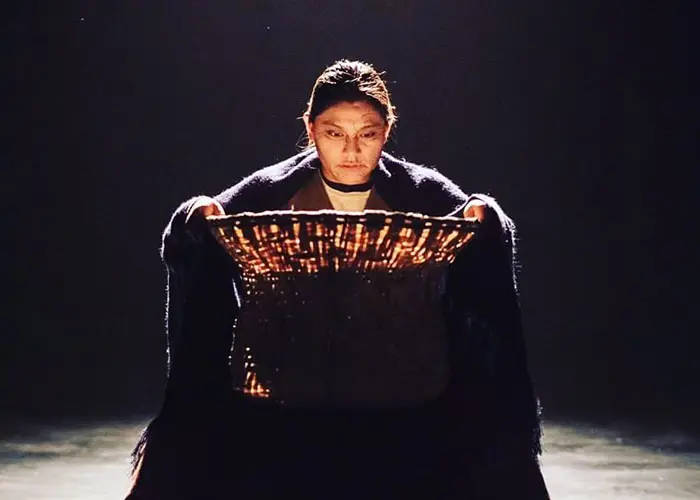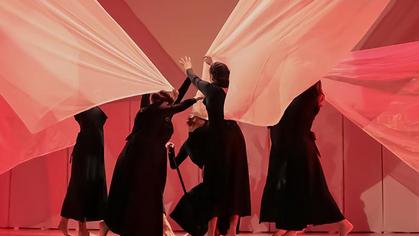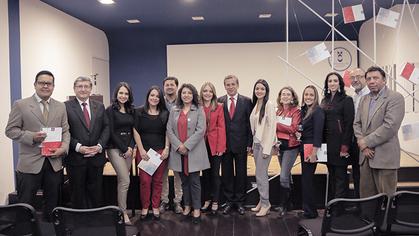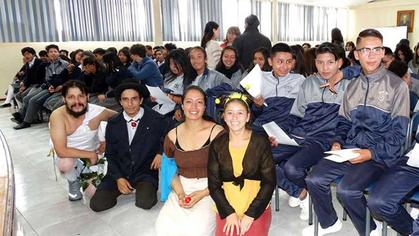IV Edition of Scenic Tours

The 26 from June to the 11 in July was the fourth consecutive edition of Scenic Tours at the University of Azuay and the Alfonso Carrasco Room of the House of Culture, organized by the final year students of the Art Career Theatrical.
Jaime Garrido, Coordinator of the race, explained that the objective of this event is for the students to show their final works: "The students have been managing the location, promotion, subscriptions and tickets. They apply in the matter of management in terms of economic management of advertising and media visits to promote their shows.
The June 26 presented "Puka Yana" by Margarita González, a work that addresses the butoh dance and the theater of cruelty, generating an experience of deep introspection in the viewer. Through surrealism, ritual and dream images, a dream journey is detonated until it reaches the unconscious and reflects the shadow itself.
This work was under the direction of María Elvira Villacís and the 17 of July was presented again.
The 1 of July was the turn of "Incident ... Alert in 120 seconds" of Grace Castro, who made an investigation about the documentary theater to talk about the historical memory of the country in relation to the killing of Aztra in 1977.
From his research and interviews in the field visit he built a play, which was directed by Juan Pablo Abril.
The July 2 presented "Uróboros" by Mateo Salazar and Walter Lliguisaca, who made the musical proposal. This work investigated how theosophy can create a show and a training.
A day later came "Ojitos de luna" by Gabriela Yunga, which revolved around the corporality of the peasant women of the Santa Isabel canton, where the field research work was reflected.
This work, which was directed by Lorena Barreto, dealt with a woman, Doña Amelia, who awaits the arrival of her son while wrapping herself in his memories, narrating the adventures and misadventures of her life as a wife and mother.
The 4 of July presented "El silencio de María" by Franklin Zumba, this was an adaptation of a literary work, the novel "El túnel" by Ernesto Sábato, under the direction of Diego Ortega and the set design by Franklin Zumba and Fernando Morales .
The next day premiered "Mary and Raul" by Pablo Rojas, the work explored stereotypes in theater and film about sexual diversity, under the direction of Juan Liger.
In addition Thelmo Tello, who is also a lawyer, presented an investigation on the criminalization of the theater in Cuenca, that is, how public spaces are not authorized for the use of artistic shows and what is happening with the fulfillment of the ordinances regarding the subject.
An experiment was also carried out in the city to measure the reaction of the citizen watch. "The conclusion is that there is much ignorance on the part of many authorities about what are the processes that have been taking place for the liberation of public spaces that were followed at the time by actor Francisco Aguirre," Garrido said.
The July 6 was presented "Gideon" by Henry Farez, who inquired about multiple personality or dissociative identity disorder.
The protagonist of the work wants to flee from his confinement to meet his daughter and must face his past in order to overcome the different personalities. This work was unipersonal where Henry Farez acted and was directed by Paul Romero.
The 8 in July presented "La Señorita" by Thais Salazar, an adaptation of a play "La señorita Julia" by August Strindberg, where they worked from a monologue to a work with several characters.The work was directed by María Elvira Villacís.
The 10 of July was the turn of "What is left" by Hilda Valdez, who inquired about the use of ethnography as a tool for the creation of the work and her research topic was the migration of both the inhabitants who leave and arrive from the country.
Hilda Valdez acted in the play and is under the direction of Diego Ortega.
Finally, the July 11 premiered '' The wonderful journey to the unknown '' by José Coronel, who investigated the methodological processes of teaching theater and how to have a good pedagogy to teach it.
The direction assistance was in charge of Jefferson Castillo and the address was José Coronel.




